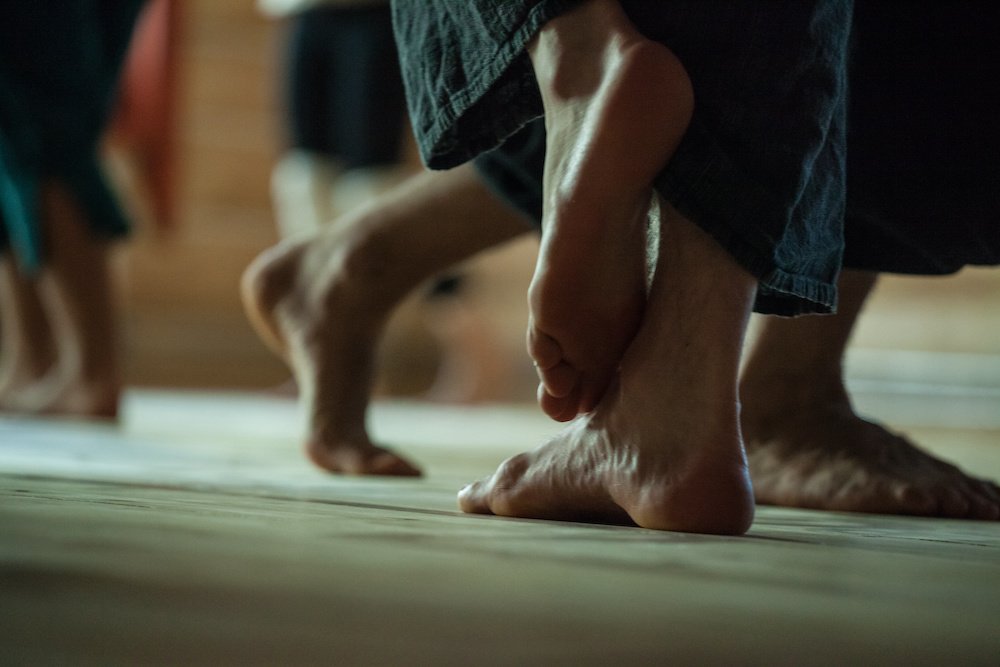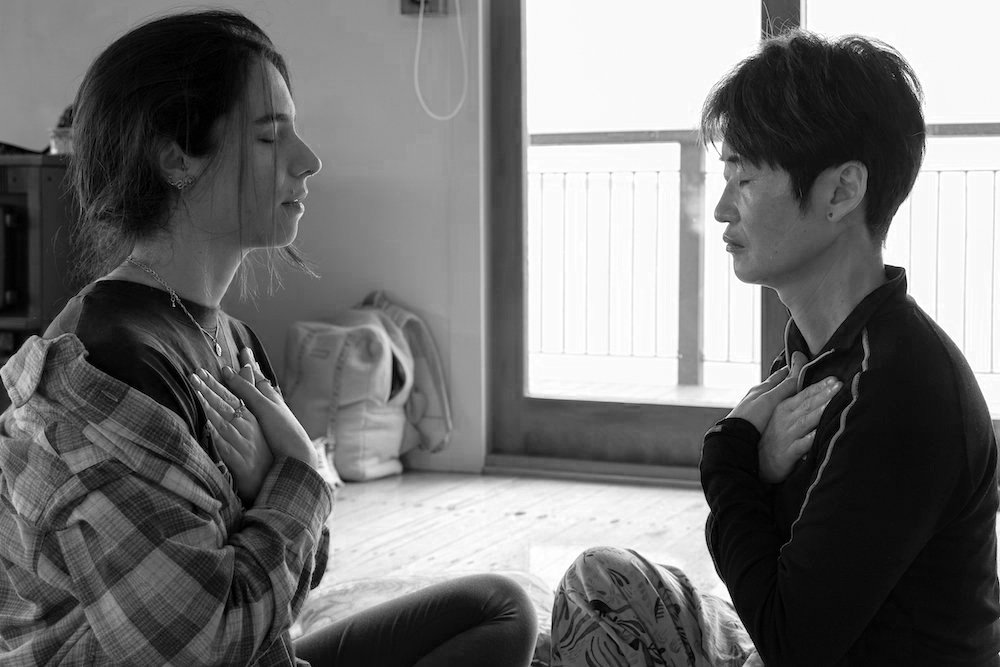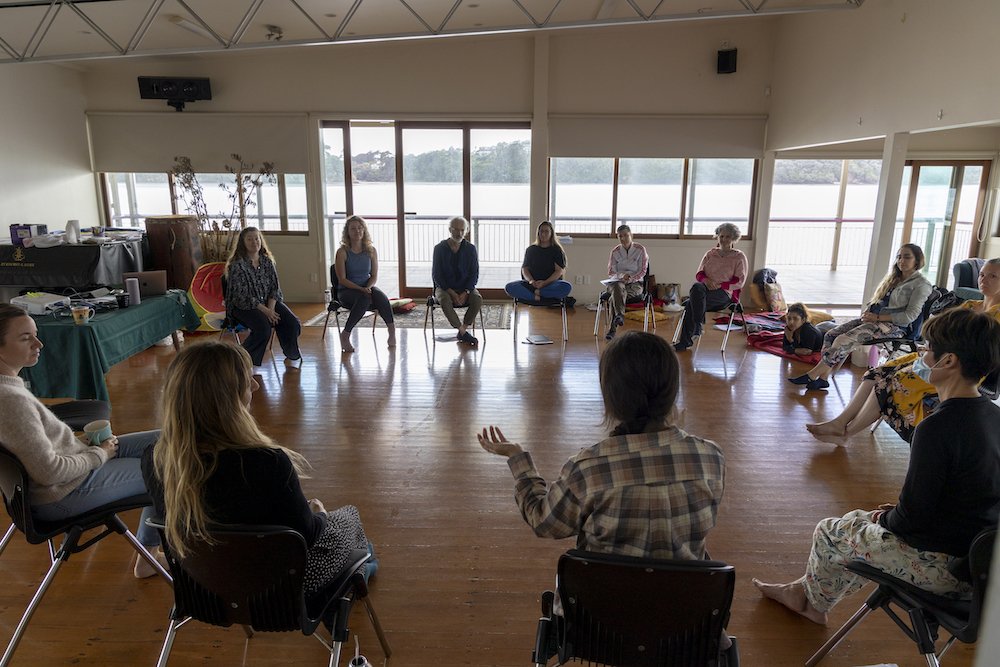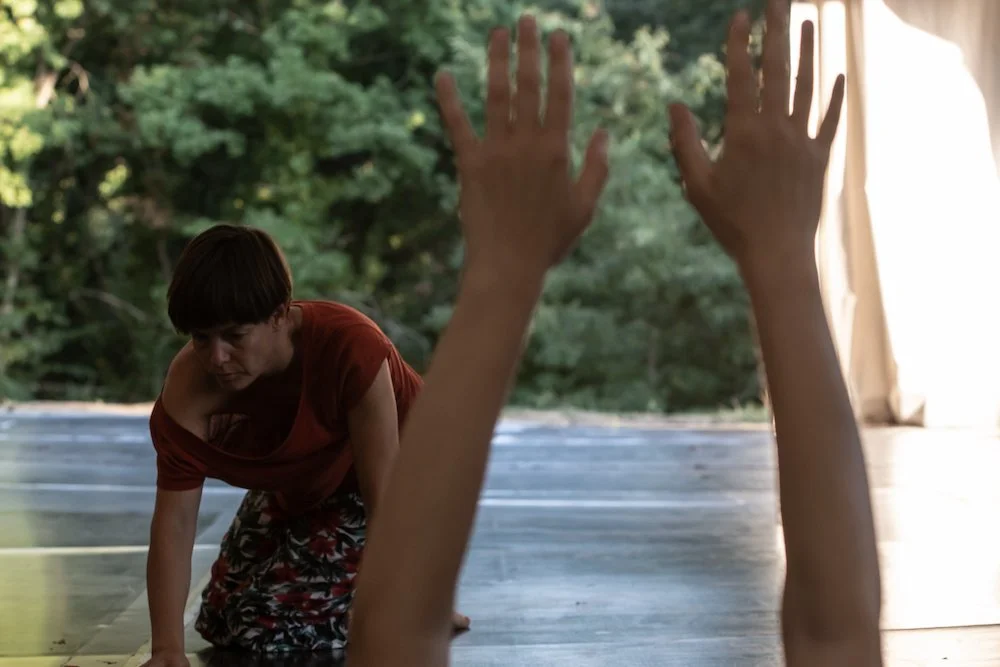
YEAR TWO
DIPLOMA IN DANCE MOVEMENT THERAPY
OVERVIEW of year two
The second year of the Diploma in Dance Movement Therapy (DMT) supports students to practise clinically, and with individuals, and to gain the required practise and supervision hours to be able to register as a dance movement therapist with the DTAA (Dance Therapy Association of Australasia) at a professional (provisional) level.
Students will work independently with their chosen populations in their local area (this can be outside NZ), with monthly seminars with local and international DMT experts plus monthly clinical supervision groups. This course will support your learning and integration of DMT clinical and/or community-based practice.
The focus of training will be on both dance movement therapy practise and skills, and also counselling skills and verbal aspects relevant for DMT, as this can be a gap for some DMTs in training.
This training is delivered predominantly online, and has one 4-day intensive that is required to attend in-person in Auckland.
STRUCTURE of year two
Year two consists of a minimum of 252 hours including placements, plus 12 optional hours (excluding assignments and readings).
Dates:
February-December
Monthly online seminars:
9 x six hour seminars delivered via live video seminars with core DMT Trainers plus special International DMT guest teachers (Saturdays 10:15am-6pm NZST)
One seminar 4-day intensive:
This 4-day intensive is required to be attended in person in Auckland, NZ (Fri/Sat/Sun/Mon - all 9:30am-5pm)
Clinical supervision sessions:
Monthly group sessions online (10 x two hour sessions), up to 5 students per group
Individual clinical supervision sessions offered to students who do not have a dance therapist on site at their local placement
Supervised placement with chosen populations:
80 client contact/leading hours with at least two populations are required for DTAA registration. This is around two hours leading sessions per week from Feb-Dec
Simulated practicum sessions:
Optional six x 2 hour sessions to practice leading your peers
Small training group size:
Maximum 20 students accepted into Year Two
Prerequisite:
First year of Diploma in Dance Movement Therapy or equivalent course. Students who have prior experience or training in the area of Dance Movement Therapy may also apply.
PROFESSIONAL MEMBERSHIP
After completing both years of the Diploma in Dance Movement Therapy, graduates will be eligible to apply for Provisional Membership with DTAA (Dance Therapy Association of Australasia). Once accepted into the DTAA, graduates will be able to work independently in the field of Dance Movement Therapy, gaining Full professional membership with DTAA once reaching required supervised work experience hours.
SEMINAR TEACHING APPROACH WILL COMBINE:
Experientials
Video observation
Lecture & discussion
Theoretical reading
Discussion
Embodied experience
Small group practice
Opportunities to facilitate with feedback
Case presentation & discussion

live video seminars
2026
Saturdays 10:15am-6pm (NZST)
SEMINAR intensives
Take a peek into a 4-day intensive!
7 February
7 March
18 April
16 May
25 July
15 August
12 September
17 October
21 November
2026
Friday to Monday (required in person, Auckland)
9.30am-5pm (NZST)
12-15 June
Mid year break: 22 June - 12 July
year two SEMINARS
-
The course begins with the practice of whanaungatanga - connecting and reconnecting in our relationships as student peers and teachers. We will return to the counselling model of the Person Centred Approach as a base from which to practice as students move into more clinical and individual DMT practice over the course of the second year. The seminar will go deeper into this model, which will be a core model that is utilised throughout this year’s course. Through this model, students will explore verbal therapy tools that complement DMT practice. This model will also be drawn on to support students deepening understanding of how to develop safe and trusting therapeutic relationships, and how to develop a therapeutic alliance for positive client outcomes.
Group dynamics will also be explored, with the training group as a platform for investigation and curiosity about how groups form, reform, and move through different stages. This exploration aims to support the students’ deepening understanding of group processes as they move into more active facilitation of therapeutic groups this year.
-
In Year one module three, a range of therapeutic models were introduced. In this seminar we explore the historical connections and relationship between a range of psychotherapeutic models that underpin and inform DMT, and the development of contemporary DMT practice. Aspects of some of these models are utilized to support students developing understanding of both verbal and non verbal communication and relational dynamics. There will be a particular focus on psychodynamic, person centered and trauma informed models and these models will be illustrated by case studies.
Cultural awareness and understanding is fundamental to clinical practice, and this seminar will also begin to explore cultural considerations with an emphasis on Aotearoa/NZ’s indigenous Māori culture. For those students living and working in other cultural contexts, this specific cultural exploration can provide a template for engagement and cultural sensitivity that can be transferred to other cultural and clinical contexts.
-
This seminar will further the developmental theory base that was introduced in Year one module three, covering both key cognitive and psychosocial development across the lifespan that underpin DMT practice. We will also return to concepts introduced in Year 1 module 5 in regard to the clinical process, with a focus on the individual client. This focus supports students to gain knowledge and confidence in order to begin individual work during this year.
This seminar will enhance the clinical reasoning process which links assessment findings to the formulation of a therapeutic plan, to goal setting and to the ongoing reviews/working towards an outcome. Students will be challenged to rationalise their therapeutic plan by linking to relevant theory/frameworks.
-
This seminar will return to the Laban Bartenieff Movement System (LBMS) and MARA (Movement, Assessment and Reporting App) both of which were introduced in Year one module four and five. In this seminar LBMS will be applied to understanding relational, psychological and emotional aspects of DMT practice.
Students will also be supported to understand on a deeper level who they are as a mover considering their own familial history, cultural context, and movement preferences, and how this impacts their observation and assessment of others’ movement. There will also be time and space for experiential exploration and application of LBMS and MARA to movement observation and analysis, with a focus on the individual client.
-
In Year one module four, a range of DMT intervention skills were introduced, with a focus on group work. This seminar returns to the practical application of DMT tools with a focus on individual client sessions and considering the valuable lens of culture. The seminar will be highly experiential and practice based, allowing plenty of time to explore and experiment with the application of dance skills, sensory experience, aesthetics, symbols, imagery, metaphor, themes, props, music and other elements of successful DMT individual sessions. Case studies will be presented to demonstrate applications of some of these skills with individual clients.
-
This four day intensive will be primarily experiential, focused on providing opportunities for students to lead each other in individual and small group sessions, in order to further apply and practice DMT intervention skills with individuals and groups. There will be opportunities for role plays to try out clinical skills in particular those related to intake, assessment, treatment planning and interventions.
This seminar begins with a return to considering cultural models and practice in the specific context of Aotearoa/NZ before focusing on practical, clinical skills with children and then with adults. There will be further exploration of the clinical reasoning process, which links assessment findings to the formulation of a therapeutic plan, to goal setting and to the ongoing reviews/working towards an outcome. Students will be challenged to rationalise their therapeutic plan by linking to relevant theory/frameworks.
Anatomy, physiology and the mechanics of the nervous system will also be reviewed, adding to the material that was introduced in year one module two. The application of anatomy and physiology to DMT practice will be explored, with particular reference to assessment, therapeutic planning and regulation. Regulation and mindful, self-aware practice will be explored as fundamental to effective DMT practice.
The Laban Bartenieff Movement System (LBMS) will also be explored further in regard to understanding relational, psychological and emotional aspects of DMT practice. Ethical requirements for DMT practice that were introduced in year one module six will be returned to, with opportunity for discussion and exploration of the ‘grey area’ that ethics is crucial in navigating in particular the use of touch, boundaries and other ethical considerations.
-
This seminar will further the developmental theory base that was introduced in Year one module three, covering both key cognitive and psychosocial development across the lifespan that underpin DMT practice. These developmental processes will also be explored through the lens of culture.
-
Research is an important aspect of DMT practice, so that we can provide evidence-informed DMT, understand existing and developing literature, and contribute our therapeutic insight to the others within and outside of the profession. Basic research skills that were briefly introduced in year one module six will be reintroduced, to support students to write a final individual case study after seminar ten.
The exploration of ethical practice in DMT will continue in more depth. Case examples will be given as a springboard for clinical discussion amongst the students, along with a close examination of the DTAA Code of Ethics and Rules of Professional Conduct. Areas to be considered include boundaries, confidentiality and its limits, and dual relationships.
-
This Seminar will focus on preparing students to be able to set up and work in private practice post-course completion. Knowledge around risk assessment, health and safety and record keeping will be covered in more depth than Year 1, with a focus on individual client work.
Practical skills and tools will be discussed and explored, including elements needed to set up a therapy business, how to research and access funding, basic accounting skills needed for self employment, insurance, supervision requirements, marketing, networking and how to ‘sell’ DMT and yourself as a therapist in the community. Finding and developing DMT work opportunities in the students’ particular location and context will also be explored.
-
As we come to the end of this year and the entire two year course, and prepare to write a final individual client case study, it is important to review what we have learned and reflect on what has been most important to our learning and development. It is also an ending of this particular training group, and offers an opportunity for us to reflect on how we manage endings, and how that can impact on how we may work with endings and closure in our therapeutic relationships. Awareness brings choice, and the ending process is an important aspect of therapy for us to be able to implement conscious decisions.
The DTAA Competencies will be included in the students’ reflections, in order to identify areas of strength, and areas for further development and future learning post training and prior to gaining full professional membership of the DTAA. The application process to become a Provisional DTAA professional member will be reviewed, so that students feel confident to access this essential DMT community, resource and professional body.





